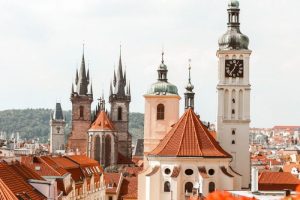
As Heritage festivals and cultural events take the spotlight, immerse yourself in a world rich with tradition and diversity. Explore the essence of these celebrations that bring communities together and showcase the beauty of different cultures.
Delve into the economic impact on local businesses and tourism, as we uncover the significance of these events in preserving heritage and fostering inclusivity.
Heritage Festivals and Cultural Events
Heritage festivals play a crucial role in preserving cultural traditions that have been passed down through generations. These events provide a platform for communities to showcase their unique customs, rituals, music, dance, food, and art, ensuring that these aspects of their heritage are not forgotten or lost over time.
Cultural events contribute to promoting diversity and inclusivity in communities by bringing people from different backgrounds together to celebrate and appreciate each other’s cultures. Through these events, individuals have the opportunity to learn about and understand the customs and traditions of others, fostering a sense of unity and mutual respect.
Furthermore, heritage festivals have a significant economic impact on local businesses and tourism. These events attract visitors from near and far, generating revenue for hotels, restaurants, shops, and other establishments in the area. Additionally, they help boost tourism by showcasing the unique cultural offerings of a region, attracting tourists who are interested in experiencing authentic cultural experiences.
Spiritual Journeys
Embarking on a spiritual journey is often a quest for inner peace, enlightenment, and deeper connection with oneself and the world around us. It offers individuals a chance to explore their beliefs, values, and purpose in life.
Appeal of Spiritual Journeys
Spiritual journeys appeal to individuals seeking solace, clarity, and a sense of belonging. The opportunity to disconnect from the chaos of daily life and reconnect with one’s spiritual essence is a powerful draw for many.
Contribution to Personal Growth
Spiritual destinations provide a conducive environment for self-reflection, introspection, and personal growth. By immersing oneself in the serenity of these sacred sites, individuals can gain new perspectives, overcome challenges, and cultivate a deeper understanding of themselves.
Cultural Significance of Spiritual Sites
Spiritual sites around the world hold immense cultural significance, often serving as repositories of history, tradition, and collective memory. These sacred places are not only places of worship but also symbols of cultural identity, heritage, and spiritual heritage.
Remote Destinations

Remote destinations hold a special allure for travelers seeking solitude and adventure. The untouched landscapes and unique cultures found in these far-off places offer a sense of escape from the hustle and bustle of modern life.
Traveling to remote locations, however, comes with its own set of challenges and rewards. The journey to reach these destinations can be arduous, requiring long hours of travel by air, sea, or land. Once there, travelers may face limited amenities and infrastructure, forcing them to rely on their own resourcefulness and adaptability. Yet, the sense of accomplishment and the unparalleled experiences gained from exploring these hidden gems make the challenges worthwhile.
Impact on Preservation
- Visitors to remote destinations can bring economic benefits to local communities, supporting sustainable development and conservation efforts.
- However, the influx of tourists can also pose a threat to the preservation of remote cultures and environments. Increased foot traffic can degrade natural habitats, disrupt traditional ways of life, and introduce invasive species or diseases.
- It is crucial for travelers to be mindful of their impact and to engage in responsible tourism practices, such as respecting local customs, minimizing waste, and supporting initiatives that promote environmental stewardship.
Theme Park Vacations
Theme park vacations have come a long way from simple amusement park rides to immersive experiences that transport visitors to different worlds. With the advancement of technology, these parks have evolved to provide unforgettable adventures for families and friends looking to create lasting memories.
Evolution of Theme Parks
Theme parks have transitioned from traditional roller coasters and carnival games to elaborate themed lands that offer a fully immersive experience. Visitors can now step into their favorite movies, TV shows, or fairy tales, thanks to the attention to detail and storytelling in these modern parks.
Role of Technology
- Virtual Reality (VR) and Augmented Reality (AR) have revolutionized theme park experiences, allowing visitors to interact with digital elements in the physical world.
- Mobile apps provide real-time updates on wait times, show schedules, and dining options, enhancing convenience and personalization during the visit.
- RFID technology has streamlined park entry, ride access, and payment systems, reducing wait times and improving overall guest experience.
Tips for Planning a Memorable Theme Park Vacation
- Research the park’s attractions, shows, and dining options in advance to create a customized itinerary based on your interests.
- Consider purchasing FastPasses or express tickets to skip long lines and make the most of your time in the park.
- Pack essentials such as sunscreen, comfortable shoes, refillable water bottles, and portable phone chargers to stay comfortable throughout the day.
- Book accommodations near the park to maximize your time and minimize travel stress, especially if visiting multiple parks in the area.
- Create lasting memories by taking photos, trying new experiences, and enjoying the moment with your loved ones.
Private Jet Travel

Private jet travel offers a level of luxury and convenience that surpasses commercial airlines. From personalized service to flexibility in flight schedules, flying on a private jet provides a premium experience for discerning travelers.
Luxury and Convenience
- Exclusive and personalized service tailored to individual needs
- No long security lines or crowded airports, offering a seamless travel experience
- Ability to depart on-demand, avoiding fixed commercial airline schedules
- Luxurious amenities onboard, including spacious cabins, gourmet dining, and privacy
Environmental Impact and Sustainable Alternatives
Private jet travel has a higher carbon footprint compared to commercial airlines, leading to concerns about its environmental impact. To address this issue, there has been a rise in sustainable alternatives in the private aviation industry.
- Offset programs to mitigate carbon emissions from private jet flights
- Investment in eco-friendly aviation technologies to reduce fuel consumption
- Promotion of hybrid-electric and electric aircraft for more sustainable air travel
Rise of Private Jet Travel Services
The demand for private jet travel has been increasing, with a growing number of companies offering private jet services to cater to different demographics. These services are not just limited to the ultra-rich but are becoming more accessible to a wider range of travelers.
- Customized travel experiences for corporate executives, celebrities, and high-net-worth individuals
- Subscription-based models and on-demand charters for frequent flyers
- Emphasis on safety, privacy, and exclusivity to attract discerning travelers
Luxury Train Journeys
Luxury train journeys offer a unique blend of charm and nostalgia for modern travelers, allowing them to experience a bygone era of elegance and sophistication on the rails. These journeys provide a luxurious and leisurely way to explore picturesque landscapes while enjoying top-notch amenities and impeccable service on board.
Iconic Luxury Train Routes
Luxury train routes such as the Orient Express, Palace on Wheels, and the Blue Train have a rich history and cultural significance that dates back to the early days of train travel. The Orient Express, for example, was synonymous with luxury and glamour, catering to royalty, celebrities, and dignitaries as they traversed Europe in style. These iconic routes have become synonymous with opulence and grandeur, offering passengers a glimpse into a bygone era of train travel.
Amenities and Experiences
Luxury train journeys are known for their lavish amenities and unique experiences that set them apart from traditional modes of transportation. From luxurious cabins and gourmet dining to onboard spa services and entertainment, passengers are treated to a pampering experience that ensures a relaxing and unforgettable journey. Some luxury trains even offer off-train excursions to explore local attractions and immerse passengers in the culture and history of the destinations they visit.
Agricultural Tourism
Agricultural tourism, also known as agri-tourism or agritourism, involves visiting working farms, ranches, vineyards, and other agricultural operations for the purpose of experiencing rural life and gaining insight into agricultural practices.
Benefits of Agricultural Tourism
- Boosts rural economies by providing additional income streams for farmers and local communities.
- Promotes sustainable agriculture practices and environmental conservation.
- Preserves cultural heritage and traditions related to farming and rural life.
- Offers educational opportunities for visitors to learn about food production and the importance of agriculture.
Activities and Experiences on Agricultural Tours
- Harvesting fruits and vegetables.
- Participating in farm chores and activities such as milking cows or feeding animals.
- Tasting farm-fresh produce and locally made products.
- Taking guided tours to learn about different crops and livestock.
Importance of Sustainable Practices in Agricultural Tourism
Sustainable practices in agricultural tourism are crucial for minimizing environmental impact and ensuring the long-term viability of farms and rural communities. By implementing practices such as organic farming, water conservation, and waste reduction, agricultural tourism can contribute to the preservation of natural resources and biodiversity.
Cycling Tours
For adventure seekers and fitness enthusiasts, cycling tours offer a unique and exciting way to explore new destinations while staying active.
Appeal of Cycling Tours
Cycling tours provide a thrilling experience for those looking to challenge themselves physically and mentally. The opportunity to ride through picturesque landscapes, discover hidden gems off the beaten path, and immerse oneself in the local culture make cycling tours an attractive adventure for many.
Health Benefits and Impact on Local Communities
- Cycling tours promote physical fitness and well-being, allowing participants to enjoy the benefits of outdoor exercise while exploring new places.
- By choosing cycling as a mode of transportation, tour participants contribute to sustainable tourism practices and reduce their carbon footprint, benefiting the environment and local communities.
- Engaging with local businesses, interacting with residents, and supporting small vendors along the cycling route also help boost the economy and create a positive impact on the community.
Popular Cycling Tour Destinations and Routes
- The Camino de Santiago in Spain offers a historic and spiritual journey for cyclists, with various routes catering to different preferences and fitness levels.
- The Danube Cycle Path in Europe is a scenic route that follows the majestic Danube River, passing through picturesque villages, vineyards, and historic landmarks.
- The Great Ocean Road in Australia provides a breathtaking coastal ride with stunning ocean views and diverse wildlife encounters along the way.
- Chiang Mai in Thailand offers a cultural cycling experience, allowing participants to explore ancient temples, lush jungles, and traditional villages in the northern region of the country.
Wine and Vineyard Tours
Wine and vineyard tours play a crucial role in promoting the local terroir of a region. These tours offer visitors a firsthand experience of the unique characteristics of the land, climate, and culture that influence the flavors of the wines produced in that area. By showcasing the vineyards and wineries, these tours help to create a deeper connection between consumers and the local heritage of winemaking.
Cultural Significance of Wine Production
Wine production is deeply intertwined with the heritage of a region, reflecting centuries-old traditions and practices passed down through generations. The process of growing grapes, harvesting them at the optimal time, fermenting the juice, and aging the wine in oak barrels all contribute to the distinct flavors and aromas that define a particular wine. Each step in the winemaking process carries cultural significance, from the selection of grape varieties to the techniques used by winemakers.
Rise of Wine Tourism and Economic Impact
The rise of wine tourism has had a significant impact on rural economies, particularly in regions known for their vineyards and wineries. Visitors who embark on wine and vineyard tours not only contribute to the local economy through tourism spending but also help to raise awareness of the region’s wines on a global scale. This increased exposure can lead to greater demand for the wines produced in the area, boosting sales and creating opportunities for local producers to expand their reach.
Heritage Tourism
Heritage tourism plays a crucial role in preserving historical sites and traditions, allowing visitors to experience the rich cultural heritage of a destination.
However, the development of tourism can often pose challenges when trying to strike a balance between promoting tourism growth and conserving the heritage sites and traditions that attract visitors in the first place.
Successful Heritage Tourism Initiatives
- The Historic Centre of Rome, Italy: A UNESCO World Heritage Site that successfully manages to attract millions of tourists each year while preserving its ancient monuments and architecture.
- Machu Picchu, Peru: Despite its popularity as a tourist destination, efforts have been made to limit the number of visitors to protect the site from overcrowding and environmental damage.
- Angkor Wat, Cambodia: Through sustainable tourism practices and community involvement, Angkor Wat has been able to maintain its cultural significance while benefiting the local economy.
City Breaks
City breaks offer travelers the perfect opportunity to explore vibrant urban destinations, immerse themselves in local culture, and experience the hustle and bustle of city life.
Appeal of City Breaks
City breaks are ideal for travelers who want to make the most of a short trip, as they provide a concentrated dose of culture, history, and entertainment in a compact timeframe. Whether you’re a foodie, history buff, art enthusiast, or simply enjoy exploring new places, city breaks offer something for everyone.
Planning a Memorable City Break Itinerary
- Research the city’s top attractions and create a list of must-visit places.
- Consider your interests and tailor your itinerary to include activities that align with them.
- Leave room for spontaneity and exploration, as some of the best experiences can happen unplanned.
- Book accommodations in a central location to maximize your time in the city.
- Try local cuisine and immerse yourself in the culinary scene of the city.
Cultural Attractions in Popular City Break Destinations
- Paris, France: Explore iconic landmarks such as the Eiffel Tower, Louvre Museum, and Notre-Dame Cathedral.
- Barcelona, Spain: Experience the unique architecture of Antoni Gaudí, visit the bustling La Boqueria market, and relax on the sandy beaches.
- New York City, USA: Take in Broadway shows, stroll through Central Park, and visit world-class museums like the Metropolitan Museum of Art.
- Tokyo, Japan: Discover the blend of tradition and modernity in neighborhoods like Shibuya and Shinjuku, and indulge in delicious street food.
Final Thoughts
From preserving cultural traditions to boosting local economies, Heritage festivals and cultural events play a pivotal role in shaping our society. As we reflect on the impact of these celebrations, we are reminded of the power of diversity and the richness it brings to our communities.
General Inquiries
What is the importance of heritage festivals in preserving cultural traditions?
Heritage festivals serve as a platform to showcase and pass down cultural practices, ensuring they are not lost over time.
How do cultural events promote diversity and inclusivity in communities?
Cultural events bring people from different backgrounds together, fostering understanding and celebrating the unique aspects of each culture.
What is the economic impact of heritage festivals on local businesses and tourism?
Heritage festivals can boost local economies by attracting tourists, increasing revenue for businesses, and creating job opportunities.





